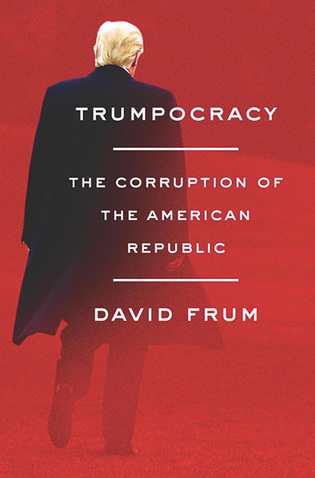 loading
loading
Arts & CultureReviews: May/June 2018Books on Trumpism, gender in the workplace, and Silicon Valley.  View full imageTrumpocracy: The Corruption of the American Republic David Greenberg ’90, a historian at Rutgers University, is the author, most recently, of Republic of Spin. Has any group of thinkers stood faster in defense of its principles since the rise of Donald Trump than the neoconservatives? A decade ago, when the political right had fallen on hard times, the neocons were derided by almost everyone for furnishing an intellectual rationale for the invasion of Iraq by George W. Bush ’68. But since 2016, neoconservatives—practically alone on their side of the aisle—have consistently opposed Trump for the damage they see him doing. Writers like Max Boot ’92MA, Eliot Cohen, Jennifer Rubin, James Kirchick ’06, Bret Stephens, Cathy Young, and Bill Kristol have resisted the pressures of tribalism at a moment when few dare to leave their partisan tents. Despite serving in the Bush administration, David Frum ’82, ’82MA, was among the first neoconservatives to decry the angry populism emerging within his party. Now a writer for the Atlantic, he has turned into a fierce Trump critic. Trumpocracy: The Corruption of the American Republic mounts an impassioned case against the president on almost every count imaginable, from his flip-flopping on policy to his attacks on the press to his foreign policy, which has strained relations with US allies. Above all, Frum worries for our system of government, arguing that Trump is taking America down the path followed by autocrats like Erdogan of Turkey and Putin of Russia. Like many quickly published books, Trumpocracy relies heavily on articles from around the web, not original reporting. And the swift-moving nature of events undermines the confident tone of his pronouncements—such as when he talks of Trump plunging the country into the Syrian civil war (last year’s cruise missile attack wasn’t part of a larger commitment) or breaking his commitment to move the US embassy in Israel to Jerusalem—something Trump took steps to do, not long after the book went to press. But it’s too soon to expect a detached, sober assessment of this president. Frum is instead ringing an alarm. And, in the course of doing so, he offers powerful arguments and sharp insights. What Trumpocracy delivers in the end is an intelligent and scathing portrait of Trump in his first year, as he struggles to transform not just the Republican party but American democracy itself.
|
|